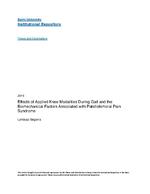|
|

Notes
- Abstract:
- Patellofemoral pain syndrome (PFPS) is one of the most common overuse knee disorders among the physically active population. There are several biomechanical factors associated with PFPS. Three main factors associated with PFPS are the knee adduction angle, the internal tibial rotation angle, and the anterior shear force. The purpose of this study was to compare the biomechanical alterations related to the application of three different knee modalities: kinesio tape (KT), a neoprene sleeve (NS), a hinge brace (HB), and no modality on healthy knees during weight acceptance of gait to determine which intervention was most effective in the reduction of three main factors that are associated with PFPS. Twenty-five healthy volunteer participants (female = 14; male = 11) with the average age of 30.08, height = 1.74m, and weight = 72.78kg completed 12 gait trials each. The four randomized test conditions consisted of a control (no applied modality), an Ossur neoprene knee sleeve, an Ossur hinge brace, and Kinesio tape (neutral knee taping). Seven infrared VICON motion capture cameras, lower body marker system, and two AMTI force were used to collect the kinematic and kinetic data. A repeated measures MANOVA (p < 0.05) analyzed the data to identify if there were significant differences between the different test conditions and the factors tested. Results revealed significant differences between the different modalities and the factors associated with PFPS. Both the kinesio tape (p < 0.01) and the hinge brace (p < 0.01) significantly reduced the anterior shear force during weight acceptance of gait compared to the control and the sleeve trials. The hinge brace also significantly increased both the knee adduction angle (p < 0.01) and the internal tibial rotation angle (p < 0.01) during weight acceptance of gait compared to the other test conditions. Although not significant, the KT revealed moderate results for both the internal tibial rotation and the knee adduction angle comparable to the results found for the control and the neoprene sleeve trials during weight acceptance of gait. The results of this study conflicted with previous research findings in which the hinge brace significantly reduced internal tibial rotation and knee adduction angles during gait and step descent tasks. Further research should be conducted to eliminate conflicting results and ultimately provide the best understanding of how these modalities alter the mechanical factors associated with patellofemoral pain syndrome.
- Thesis:
- Thesis (M.S.)--Barry University, 2016
- Bibliography:
- Includes bibliographical references (leaves 83-85).
Record Information
- Source Institution:
- Barry University
- Holding Location:
- Barry University Archives and Special Collections
- Rights Management:
- Copyright Lyndsay Segarra. Permission granted to Barry University to digitize, archive and distribute this item for non-profit research and educational purposes. Any reuse of this item in excess of fair use or other copyright exemptions requires permission of the copyright holder.
- Resource Identifier:
- RD561.S44 2016_SegarraLyndsay ( BU-Local )
- Classification:
- RD561.S44 2016 ( lcc )
|
|